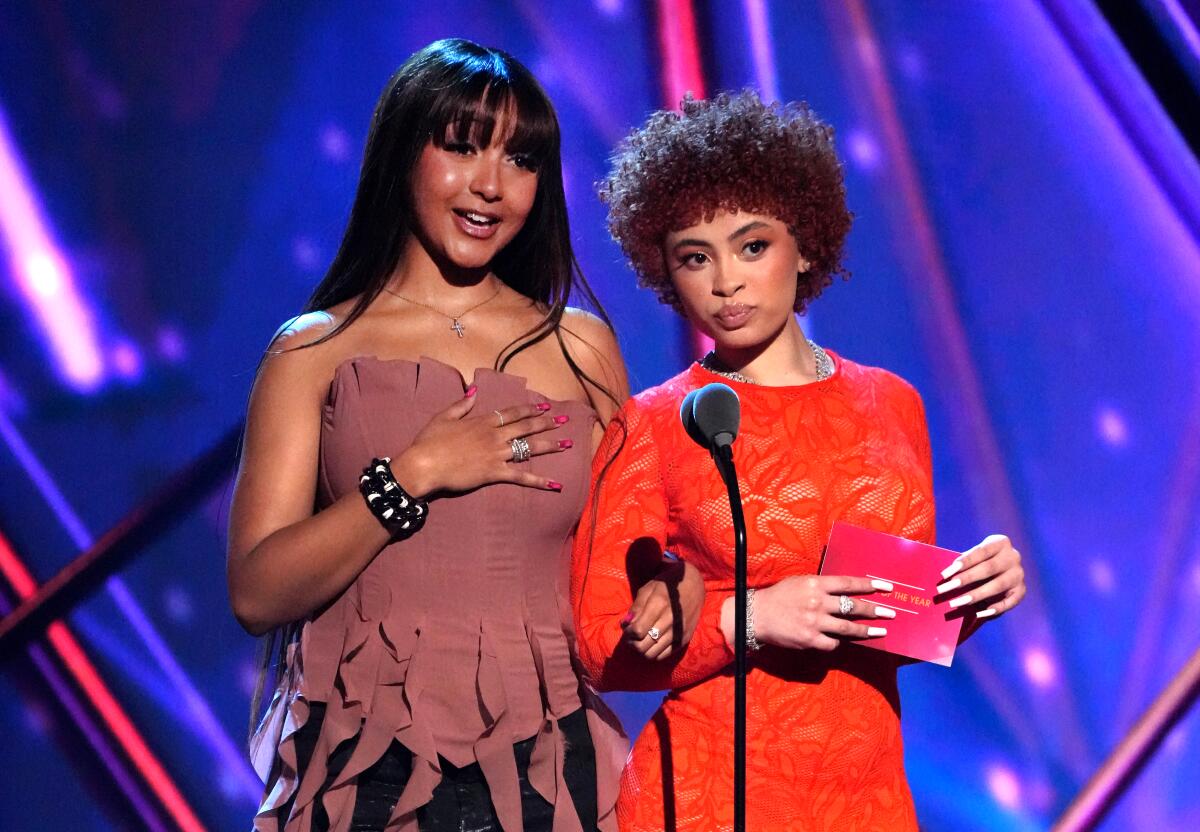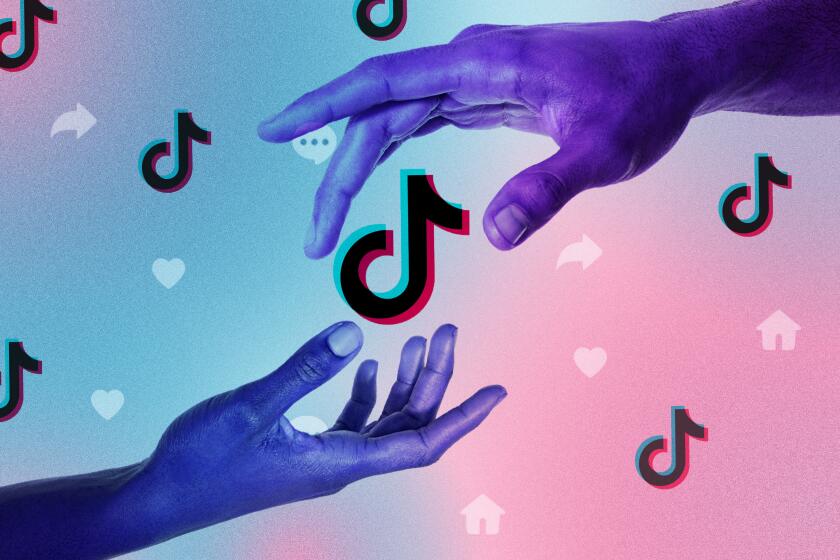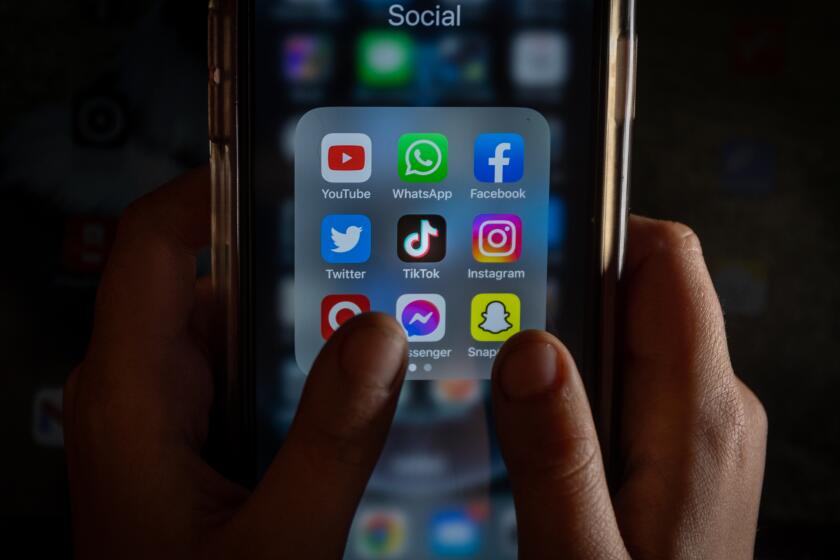As government threatens TikTok shutdown, the music industry holds its breath

- Share via
Superstar Pride was in his bed at 2 a.m. one morning, writing the words to what would become the Mississippi rapper’s breakthrough hit, “Painting Pictures.” He knew it was special by the time it left his pen, and quickly uploaded it to YouTube and Audiomack to watch the song spread.
He was happy with its initial surge, but it wasn’t until he uploaded the track universally through United Masters that he was able to start posting it on the short-form video app TikTok, which raised its reach exponentially.
“TikTok was the last platform I had to conquer,” he said.
Pride uploaded a snippet of him rapping along to “Painting Pictures” in February, sporting his inventive “shag” haircut that was short on top and long in the back. The video racked up millions of views, while scores of user-generated parodies rapping the lyrics “and mama, don’t worry, you raised a gangster, I’m a survivor” pushed it into the Billboard Hot 100 (The song is currently No. 25).
“I f— with all of them,” he said of the myriad TikTok clips built around “Painting Pictures.” “A couple stood out to me, I saw someone with an airplane, and another guy had a Suburban. It was crazy.”
Pride‘s story is far from unique. In the past several years, TikTok has become the dominant platform for burgeoning artists to make a name for themselves; not only via their own short-form videos, but those of others who use their music to soundtrack their own content.
Artists from Doja Cat to Lizzy McAlpine to Ice Spice, to name but a few, have enjoyed meteoric rises thanks in part to the platform, connecting with fans through humor, authenticity or both. The app has also given second life to songs whose moment had seemingly passed — look no further than Fleetwood Mac’s 1977 hit “Dreams,” which resurfaced on the Billboard Hot 100 in 2020.
Last year, TikTok’s end-of-year report highlighted that all but one of the 14 songs that topped the Billboard Hot 100 were “driven by significant viral trends on TikTok,” from Harry Styles “As It Was” to Jack Harlow’s “First Class” to Steve Lacy’s “Bad Habit.”
Is America a freer place with TikTok, or without it?
“In the early days of streaming, people said it would democratize music,” said Bill Werde, who directs Syracuse University’s Bandier music program and publishes the Full Rate No Cap newsletter. “But I don’t think it did, because when you lower that barrier of entry, it becomes very difficult to break through. Major labels, and other companies and artists with substantial marketing budgets, were really advantaged on Spotify.
“TikTok came along though, and really turned that notion on its head,” Werde continued. “Anyone could break on TikTok, and anyone did break.”
In the United States, however, TikTok faces an uncertain future. Earlier this month, the White House endorsed a bill that would give President Biden the authority to ban TikTok in the United States, or force ByteDance, the Chinese company that owns the app, to sell to an American company. Government officials have called the app a “national security threat,” citing the potential for China to force Bytedance to turn over the data of its American users, or spread misinformation to turn its citizens against its country.
Last Thursday, lawmakers on both sides of the aisle peppered TikTok Chief Executive Shou Zi Chew during a congressional hearing, demanding answers on everything from data privacy to drug use while generally appearing unaware of how the app actually worked.
“Whenever there’s something involved with music, like the [Parents Music Resource Center], it feels so weird because the people asking the questions are not that familiar with what it is,” said Jonathan Daniel, founder of Crush Music, which manages the careers of Miley Cyrus and Green Day among others. “It’s not really their fault — the people grilling TikTok, they probably just got on the app when they started the investigation. They’re not experts in it.”
Both Daniel and Werde called the hearing “theater,” after the members of Congress provided no evidence of actual misuse by the Chinese government. Still, both say there’s a realistic chance the government follows through with the ban.
“I do think there’s a possibility [that TikTok is banned], which is more a comment on my lack of faith in our current leadership than any comment on what I think should happen,” Werde said. “There’s two issues that have publicly united politicians in the last six years, and they’re both music — one is Ticketmaster, and the other is TikTok. And I think they’re wrong on both.”

What effect a shutdown would have on the music industry is up for debate. TikTok currently boasts 1 billion monthly active users worldwide, 150 million of whom live in America. While TikTok was the first (and, many feel, the best) to develop a discovery-based algorithm centered around short form videos, heavyweight competitors Meta and Google have released similar products in Instagram Reels and YouTube Shorts, respectively.
Should TikTok be banned in the U.S., there’s potential for a significant migration to one or both of those platforms (or Spotify’s new TikTok copycat, which allows users to scroll through snippets of songs and playlists catered to their taste).
“I think the TikTok algorithm is really good at feeding you content that is relatable, and another platform may be less effective in that respect,” Daniel said. “But I think there would be a small percentage of naysayers. People would just migrate to a different platform and watch the same thing.”
Labels and A&Rs have become increasingly reliant on TikTok to sign new artists and market their existing ones (which not everyone is happy about). Now several years removed from TikTok’s initial burst, Daniel feels a shift from the label side is already happening, noting how it’s relatively easy to have a song go viral but harder for the artist to sustain momentum beyond the initial interest.
“I definitely hear rumblings from the big labels that it’s not as worth it to chase those songs. They want to go back to building artists,” Daniel said.
Werde agreed that label executives have become too reliant on TikTok, but understands the impulse.
“Companies want to invest in fan bases,” he said. “They want to see that an artist has some foundation to build on.”
Yes, he continued, “labels do sometimes overindex on things that work, but at the same time, we’ve never really seen anything work the way TikTok is working. You’d have to go back to the days of ‘TRL’ on MTV to find a platform capable of moving the needle the way TikTok does.”
As the Biden administration weighs a ban on the app, many budding entrepreneurs fear losing a tool that has helped them build a robust customer base.
TikTok has helped boost music streaming numbers, and record company revenue, to new heights. Midia Research estimates 414.4 million people were subscribed to a music streaming service in 2020, growing to 523.9 million in 2021, and 616.2 million in 2022.
TikTok signed licensing deals with the three major record groups several years ago (Sony Music in November 2020, Warner Music Group in January 2021 and Universal Music Group in February 2021). In the wake of the platform’s exponential growth, labels are looking to cash in — Bloomberg reported in November the major labels were asking for increased royalties, in addition to a share of advertising revenue, in exchange for permission to use their expansive music catalogues.
With the global music industry’s growth rate slowing, more favorable contract terms could prove a multibillion-dollar cash infusion.
“YouTube made a lot of noise a couple months ago that they’d paid out $6 billion to [music] rights holders [from July 2021 to June 2022],” Werde said. “But $2 billion of those dollars just came from user-generated content that had music in it, which YouTube was able to put an ad against. So that’s the number that gives you the clearest sense of the potential of this business.”
Beyond that, it’s artists like Superstar Pride who would stand to lose the most in the absence of TikTok’s algorithm. The success of his song sparked a bidding war among labels for his services, although he’s opted to remain independent for now.
While Reels and Shorts may offer a somewhat-suitable imitation, there’s no guarantee those platforms would have the same reach, or that the communities he and other artists have fostered on TikTok would travel with them to a new platform.
“I’d lose connection with a lot of people,” Pride said of how a TikTok ban would impact him. “It would cut off opportunities. TikTok is global... It’s a free plane out of here.”
More to Read
The biggest entertainment stories
Get our big stories about Hollywood, film, television, music, arts, culture and more right in your inbox as soon as they publish.
You may occasionally receive promotional content from the Los Angeles Times.













